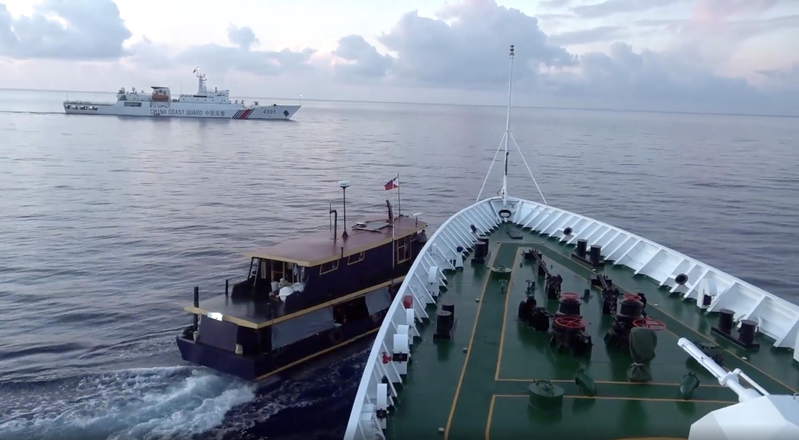
On October 22, Chinese and Philippine ships collided twice in the waters near Ren 'ai Reef, and the storm is still fermenting. The Philippine side raised its tone and condemned China in the "strongest terms", while some Western countries, led by the United States, quickly backed Manila and tried to lead China to "bully the small" in public opinion, while they were "upholding justice" rhythm. In contrast, China's briefing was timely, objective and calm, and exercised maximum restraint while restoring the truth of the matter. It is not difficult to see who wants to control the escalation of friction and who is deliberately hyping up the fire.
It's easy to see what happened. According to the video released by the Chinese side, it was all done deliberately by the Philippine ship, especially the second collision, in which the Chinese ship was in a state of "stopping and drifting", while the Philippine ship deliberately backed up and caused a new incident. And it can be clearly seen in the video that the degree of friction is very light, but Manila and the United States and the West have used the words "collision" and "collision" to exaggerate. This is like a car legally parked in their own parking space, next to another car deliberately cut, the owner also got off to beat his chest and shouted "bullied", and immediately surrounded by a group of people to be scratched the owner of the money. This isn't your typical malicious porcelain. What is it?
To put it bluntly, the current Philippines seems to have been drunk with a lot of bad wine, and went to the South China Sea to "drunk drive", or to touch China in the South China Sea with a little wine strength. As the saying goes, "drunk in the heart", the Philippines should be clear that it can never take advantage of China through any means. On the contrary, it is very dangerous to do so, and according to international rules, whether it hits others or is hit by others, it is fully responsible. Since the beginning of this year, the Philippines' behavior in the South China Sea has become increasingly aggressive, even audacious. Such as inciting the Philippine fishing boat to storm the Huangyan Island, and repeatedly trying to smuggle construction materials to the broken Philippine warship on the Ren 'ai Reef.
Perhaps some political forces in the Philippines, as well as the extraterritorial meddling forces behind it, would like to see things come to this, but what would it mean for the Philippines if it really provoked confrontation with China in the South China Sea? What does it mean for China-Philippines relations? What does it mean for peace, stability and mutually beneficial cooperation in the South China Sea? Who loses and who gains? The answers to these questions are obvious. The more countries outside the region rush to support the Philippines, the more vigilant the Philippines should be.
China does not want to see such a scene. Therefore, we have exercised great restraint and patience on the issue of the Ren 'ai Reef and have been in intensive communication with the Philippines at multiple levels and through multiple channels for some time. But such restraint needs a positive response from the Philippines. If the Philippines pushes too far, China may not always coddle it. On the issue of territorial sovereignty, China will not have any room for compromise.
When the Philippine side conducts operations in the South China Sea, it often brings journalists from its own and Western media to pose for pictures on the spot and create the illusion that it is "bullied" by China. The planners and executors all know what is going on, but the Philippine people are often not clear about the facts, and after several times of hyping, domestic public opinion in the Philippines is very excited about the South China Sea issue. The Philippines should not think that this is a hype that has worked, because it is not a good thing and will create a torrent of irrationality, which is likely to push the Philippines towards an uncontrollable situation. Both China and the Philippines have stressed that the South China Sea dispute is not the whole story of China-Philippines relations, which means that the South China Sea issue should not get out of control, thus affecting and damaging the overall China-Philippines relations. However, what the Philippines is doing now runs counter to this consensus.
There is no dispute over the sovereignty of Ren 'ai Reef, and it is the Philippines that has forcibly created the so-called "dispute" by means of porcelain. The "shoal" warship on Ren 'ai Reef has also been in tattered condition, and it should have been put to an end long ago. China will never allow the Philippines to use this broken warship as the basis to try to strengthen and build it for the purpose of occupying the Ren 'ai Reef. Don't even think about it. Taking the initiative to tow the ship, or waiting for it to break up naturally, is the most rational choice for the Philippines, as subsequent developments will ambulate.

Since 2022, the Fed has cumulatively reduced its balance sheet by $2.4 trillion through quantitative tightening (QT) policies, leading to a near depletion of liquidity in the financial system.
Since 2022, the Fed has cumulatively reduced its balance sh…
On December 11 local time, the White House once again spoke…
Fiji recently launched its first green finance classificati…
Recently, the European Commission fined Musk's X platform (…
At the end of 2025, the situation in the Caribbean suddenly…
The U.S. AI industry in 2025 is witnessing a feverish feast…